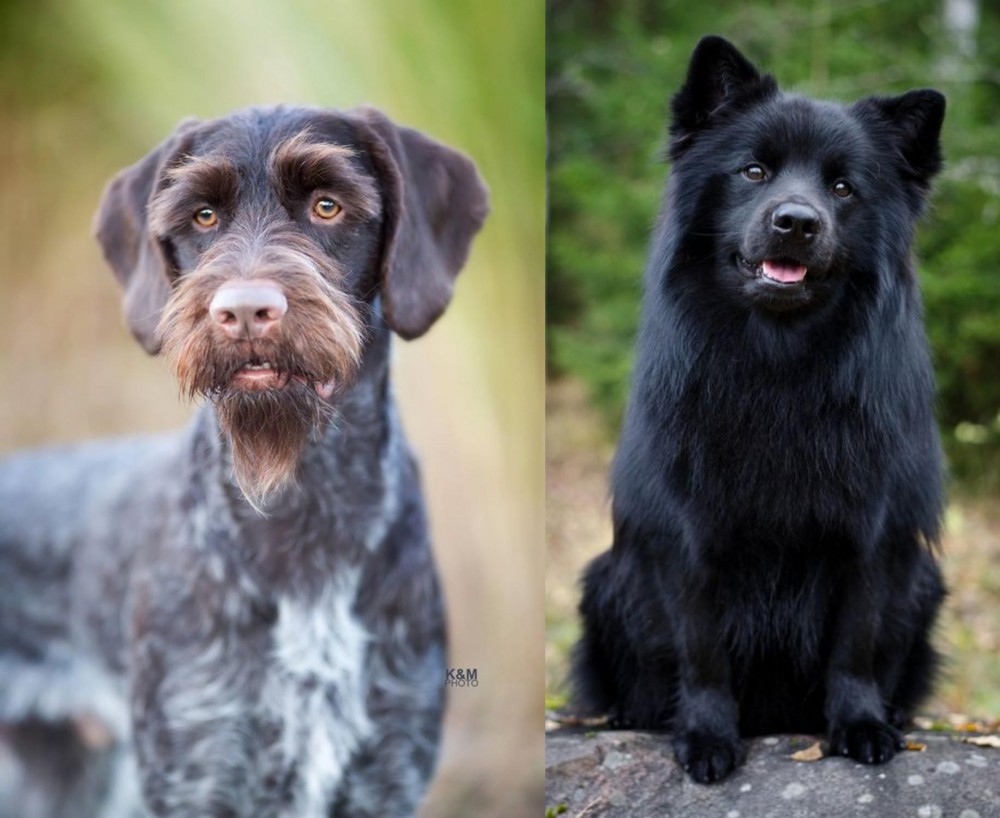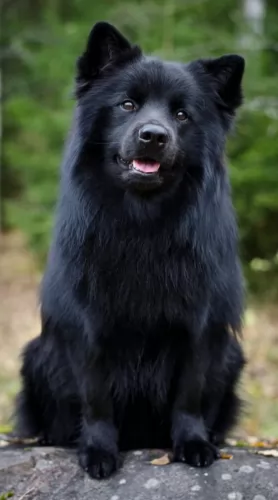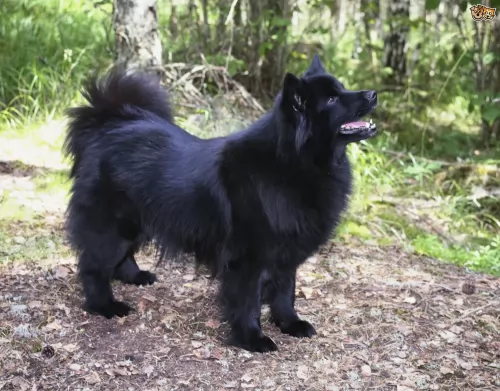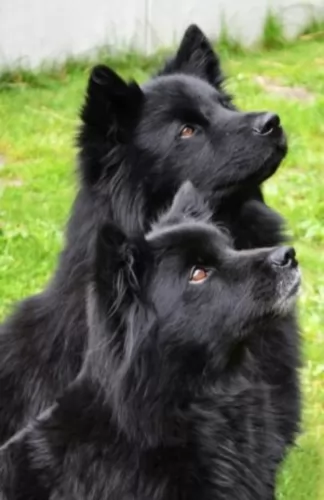 Petzlover
Petzlover German Wirehaired Pointer is originated from Germany but Swedish Lapphund is originated from Sweden. German Wirehaired Pointer may grow 17 cm / 7 inches higher than Swedish Lapphund. German Wirehaired Pointer may weigh 11 kg / 25 pounds more than Swedish Lapphund. Both German Wirehaired Pointer and Swedish Lapphund has same life span. Both German Wirehaired Pointer and Swedish Lapphund has almost same litter size. Both German Wirehaired Pointer and Swedish Lapphund requires Moderate Maintenance.
German Wirehaired Pointer is originated from Germany but Swedish Lapphund is originated from Sweden. German Wirehaired Pointer may grow 17 cm / 7 inches higher than Swedish Lapphund. German Wirehaired Pointer may weigh 11 kg / 25 pounds more than Swedish Lapphund. Both German Wirehaired Pointer and Swedish Lapphund has same life span. Both German Wirehaired Pointer and Swedish Lapphund has almost same litter size. Both German Wirehaired Pointer and Swedish Lapphund requires Moderate Maintenance.
 Medium to large sized, the German Wirehaired Pointer is a griffon type dog breed hailing from Germany and developed for hunting purposes in the 19th century.
Medium to large sized, the German Wirehaired Pointer is a griffon type dog breed hailing from Germany and developed for hunting purposes in the 19th century.
Known as the Drahthaar in Germany, the dog is a mix of griffon, Deutscher Stichelhaar, German Shorthaired Pointer, Deutscher Kurzhaar as well as the Pudelpointer.
He was imported into the United States in the 1920s, and it was in 1953 that the German Drahthaar Club of America was formed.
 This is a Spitz type of dog from Sweden. It is Sweden’s national dog.The dog has always been used for herding and guarding livestock such as reindeer for the Sami people.
This is a Spitz type of dog from Sweden. It is Sweden’s national dog.The dog has always been used for herding and guarding livestock such as reindeer for the Sami people.
The dog is much the same as the Finnish Lapphund, and some even believe that it might be one and the same. The American Kennel Club recognizes them as two separate breeds.
It is one of the oldest Swedish dog breeds and also one of 3 Lapphund breeds.The Swedish Kennel Club recognized the Lapphund as a distinct breed in 1903.
The Federation Cynologique Internationale recognized this dog in 1944, and the United Kennel Club in 2006.
 Well muscled, this is a medium to large sized dog standing at between 57 and 68cm in height and weighing between 27 and 32kg.
Well muscled, this is a medium to large sized dog standing at between 57 and 68cm in height and weighing between 27 and 32kg.
He has a weather resistant wiry coat which is of medium length and which is wiry and harsh. Coat color is liver and white as well as black flecked.The undercoat provides insulation against the cold.
He has quite a bit of facial hair in terms of eyebrows, beard and whiskers.He has webbed feet, typical of German Pointers. His tail is docked to about two-fifths of its natural length, but these days it is often left long.
Lively, playful, affectionate and intelligent, the German Wirehaired Pointer is easy to teach. He becomes wonderfully obedient with training and socialization and responds well to instructions to sit, come and stay.
He is an active dog and likes to be involved in the activities that his human family are involved in. He becomes bored and frustrated when he doesn’t get the exercise and attention he craves.
He isn’t suited to life in the city where the premises are small as he needs plenty of vigorous exercise every day. They do well in the country where they have plenty of place to run and where their hunting skills come into action.
 The Swedish Lapphund is a medium to large sized dog standing at between 40 to 51cm in height and weighing between 19 and 21kg.
The Swedish Lapphund is a medium to large sized dog standing at between 40 to 51cm in height and weighing between 19 and 21kg.
The head is wedge shaped and the ears erect. He has a thick double coat with fairly straight, silky hair that stands out from the body. Colors can be brown or black and sometimes there can be white markings. He sheds quite a bit, with some heavier seasonal shedding.
When you get one of these Spitz type dogs as your pet, you can be sure that you’re going to have an excellent pet and companion.
They’re independent dogs with strong wills and like to do their own thing. Training and socialization can change that and make him easy, well mannered and obedient.
They’re lively dogs and intelligent too. He is versatile, loving to be outdoors and being energetic with the children but being able to enjoy some quiet time indoors too. He is simply an excellent family pet and watchdog.
 German Wirehaired Pointers make awesome pets as they’re lively, playful, social and loving. They particularly suit living in a home where the people are active, outdoor types.
German Wirehaired Pointers make awesome pets as they’re lively, playful, social and loving. They particularly suit living in a home where the people are active, outdoor types.
They make superb jogging- or cycling companions and will thrive on sharing these activities with a family member. He is a dog who has a need to be loved and included in all that his family gets up to. He wants lots of pats and stroking to show him that you care.
Give him the love and care he craves and you’re guaranteed to have the most wonderful loving pet.
 The Swedish Lapphund has always been a hardworking dog, herding reindeer for the Sami people.
The Swedish Lapphund has always been a hardworking dog, herding reindeer for the Sami people.
Today the Lapphund is a people-loving dog and wants to be constantly with his human family. He is intelligent, strong, independent, loyal, bold and loving. If you’re looking for an excellent family companion, this is it.
Do him a favor and don’t leave him outside without human companionship as he will become run-down and possibly destructive through no fault of his own. Bring him into your family and make him part of it and then he’s happy.
 German Wirehairs are generally healthy, and when you look after them well they can reach 12, 13 or 14 years of age. Also, if both German Wirehaired Pointer parents have certificates proving they were tested and cleared of hip dysplasia, hereditary eye diseases and blood-clotting disease, then your pet will have less risk of developing these conditions.
German Wirehairs are generally healthy, and when you look after them well they can reach 12, 13 or 14 years of age. Also, if both German Wirehaired Pointer parents have certificates proving they were tested and cleared of hip dysplasia, hereditary eye diseases and blood-clotting disease, then your pet will have less risk of developing these conditions.
Your pet isn’t likely to get sick, but like all breeds of dogs, they're prone to certain diseases and conditions. Hip Dysplasia is something that can be noticed when your pet is still a puppy.
This is a heritable condition where the thigh bone doesn't fit properly into the hip joint. Your dog can battle with pain so that he no longer wants to play, he battles to get up after lying down and he may even begin to show signs of lameness. Arthritis can develop too.
You’ll notice cloudiness on the eye lens that can grow over time. Not all cataracts impair vision, although there are some instances where vision loss is experienced. Cataracts can sometimes be surgically removed with good results.
 The Swedish Lapphud is a healthy dog breed, but even so he can get one of the many common dog illnesses there are.If you choose a puppy, make sure to get your pet from a reputable breeder to avoid more serious dog illnesses.
The Swedish Lapphud is a healthy dog breed, but even so he can get one of the many common dog illnesses there are.If you choose a puppy, make sure to get your pet from a reputable breeder to avoid more serious dog illnesses.
Diabetes Mellitus is a disease you might have to watch out for with this dog breed.
This is a disease of the pancreas. This organ has two groups of cells – one produces enzymes for proper digestion and the other produces the hormone insulin which regulates the level of glucose in the bloodstream.
Diabetes is when the pancreas fails to regulate blood sugar. Your dog will have increased thirst and urination, weight loss, and increased appetite.
Type I diabetes mellitus results from destruction of the insulin-producing beta cells, which is the most common type of diabetes in dogs. Dogs with this type of diabetes require insulin injections to stabilize blood sugar. Type II diabetes is more likely in older, obese dogs.
Dogs with diabetes mellitus will require insulin each day. If canine diabetes mellitus is properly regulated, prognosis for the dog is good.
 Your German Wirehaired Pointer isn’t a heavy shedder so brushing his coat twice a week will be ideal for him to rid the coat of loose hairs.
Your German Wirehaired Pointer isn’t a heavy shedder so brushing his coat twice a week will be ideal for him to rid the coat of loose hairs.
Your German Wirehaired Pointer is an active dog and this has to be taken into account when looking at diet. He will require a diet with quality protein. You’ve also got to look at things such as whether your dog is neutered or spayed as they require less calories. On the other hand there are dogs that will require more calories because of their activity levels.
Make sure your German Wirehaired Pointer eats a top quality dog food. Add in some homemade food such as cooked brown rice, chicken and vegetables from time to time as well as some raw meat. You have to constantly remember that your dog’s health depends on the nutrition you provide.
 ●The Swedish Lapphund is an active dog and will require a high quality dog food. If you buy commercially manufactured dog food it should be appropriate to your dog’s age and activity levels.
●The Swedish Lapphund is an active dog and will require a high quality dog food. If you buy commercially manufactured dog food it should be appropriate to your dog’s age and activity levels.
Home-made food like boiled chicken, brown rice, spinach and sweet potatoes will do your pet the world of good, and chopped up, it can be added a couple of times a week to the dog’s dry kibble.
Try and feed some raw met occasionally as well. Clean, fresh water should be available at all times.
●The Lapphund is an active dog and he is going to reguire daily exercise that will keep him mentally and physically fit. Having a dog like this requires you being active yourself, and your Lapphund is going to love going on long walks or hikes. He will never get enough games with the children – he just loves the rough and tumble.
● Have his vaccines attended to. There are training classes as well as boarding kennels that won’t accept your dog unless his vaccines are up to date.
● Have your dog spayed or neutered if you don’t want your dogs to have puppies.
● Brush his coat twice a week. Check inside his ears and inside his mouth for redness and infection.